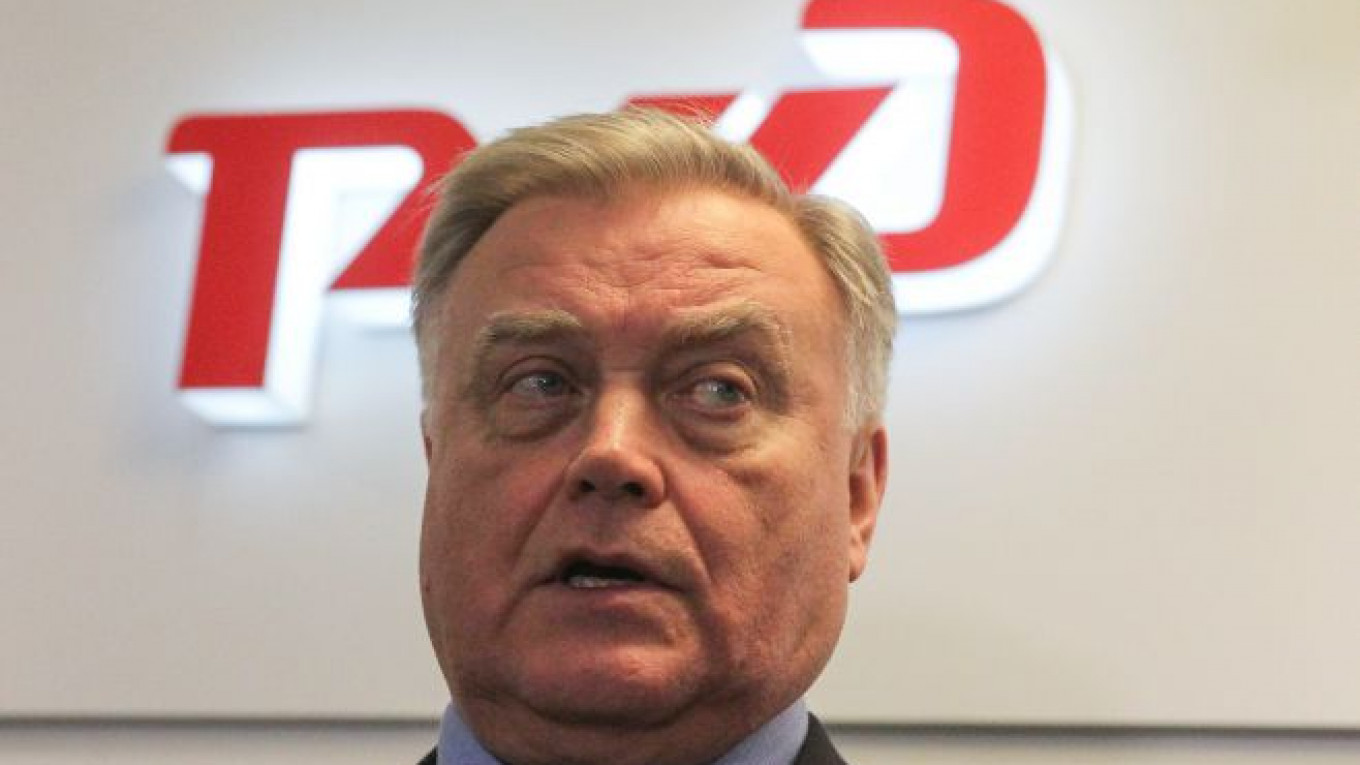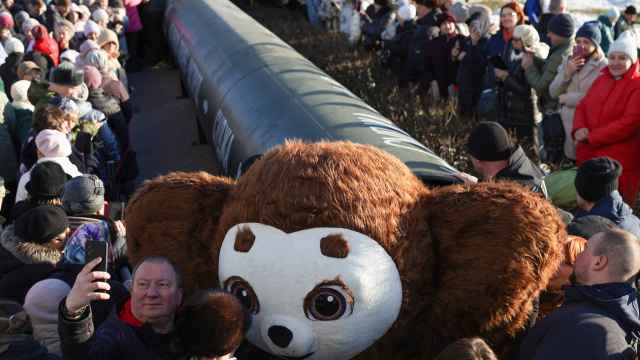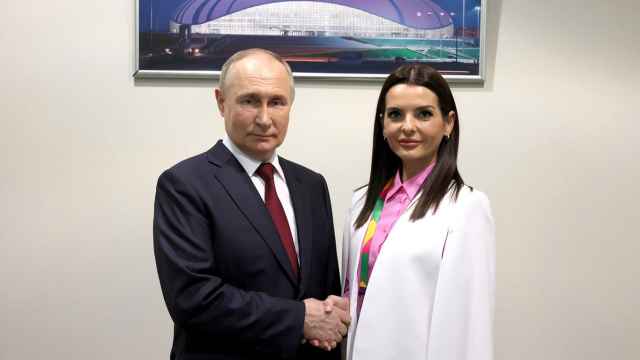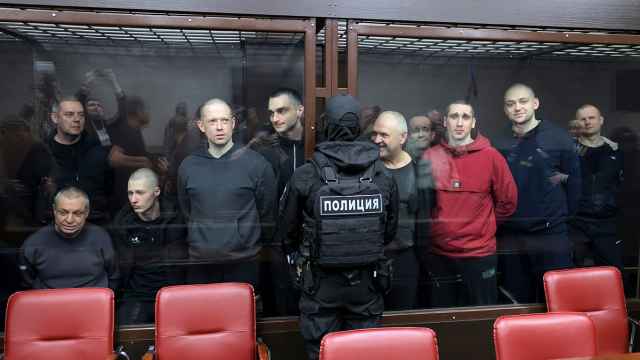Vladimir Yakunin, one of Russia’s most powerful executives and a close ally of President Vladimir Putin, was nominated as a senator for the upper chamber of the Russian parliament Monday, a position that would oblige him to step down as head of the state rail monopoly Russian Railways (RZD).
Nikolai Tsukanov, the acting governor of the Kaliningrad region, named Yakunin, 67, as one of his three candidates for the region’s representative in the Federation Council, a statement on the local electoral commission’s website said.
Such a step could only be taken on the Kremlin’s instructions, meaning it has sanctioned Yakunin’s departure from RZD, analysts told The Moscow Times on Monday.
Yakunin, who is widely seen as one of the leading conservatives in the Russian elite, has known Putin since the early 1990s. Together with other people who now occupy senior positions in the Russian government, they founded the Ozero dacha community outside St. Petersburg in 1996.
If Tsukanov, who is backed by the ruling United Russia party, wins September’s election, he will be able to appoint Yakunin to the post, which has largely symbolic powers.
“I asked him about becoming our representative in the Federation Council back at the start of the election campaign. I am glad Yakunin agreed,” Tsukanov told RIA Novosti news agency on Monday.
Under the law on the status of senators and State Duma deputies, members of the Federation Council cannot be involved in any entrepreneurial activity or do any other paid work.
Yakunin gave written consent to becoming a senator, Interfax reported Monday, citing an unidentified source. Other media outlets, including Gazeta.ru news website and Dozhd television channel, cited unidentified sources as saying he would resign from RZD.
Russian Railways had not commented on the reports by the time of publication.
The government is already discussing who is going to replace Yakunin, Dozhd reported, with RZD’s first deputy president Alexander Misharin, Deputy Prime Minister Arkady Dvorkovich, presidential aide and former transport minister Igor Levitin and Uralvagonzavod machine building factory director Oleg Siyenko among the likely candidates.
Sanctioned for Loyalty
A staunch supporter of Putin, Yakunin has authored a number of monographs arguing for Russia’s closer integration with Central Asian countries and China. He has also repeatedly criticized the United States, accusing it of trying to dominate the world.
In 2014, the U.S. imposed sanctions on Yakunin over the Ukraine crisis, calling him “a close confidant of Putin.”
According to Alexei Makarkin, deputy head of the Center for Political Technologies, a Moscow-based think tank, Yakunin did not step down earlier to avoid creating the appearance that the Kremlin is willing to surrender sanctioned individuals.
“It was clear that Yakunin would resign at one stage or another. The idea was considered a year ago, but at the time — in the context of the Ukraine crisis and recently imposed sanctions — it was decided that it was more important to demonstrate that the political system is consolidated,” Makarkin said in a phone interview.
Railways Tsar
As head of Russian Railways, Yakunin manages over 835,000 employees who work along the 86,000 kilometers of railway track, according to the company’s latest annual report. On its website, the company says it is one of the top three railway companies in the world.
Over more than a decade at the helm of RZD, Yakunin has overseen a number of significant reforms, including the liberalization of the freight car market, but in recent years was criticized for not moving these reforms further.
In particular, Yakunin resisted the calls to liberalize the locomotive market.
“He wanted to keep RZD’s monopoly on locomotives,” Andrei Rozhkov, a transport analyst at Metropol investment company, told The Moscow Times.
“In addition, many companies would acquire significant contracts with RZD due to their connections with Yakunin,” Rozhkov said in a phone interview.
‘Lame Duck’
In addition to his activities at RZD, Yakunin has developed a distinctive public image, frequently commenting on Russia’s foreign policy and the country’s economy.
In 2010, he became head of the state policy department at the political sciences faculty of Moscow State University.
A devout Orthodox believer, Yakunin also serves as chairman of the board of trustees of the Saint Andrew’s Foundation that has brought a number of Orthodox Christian relics from Greece for public veneration in Russia.
Russia’s anti-corruption crusader Alexei Navalny has repeatedly exposed Yakunin’s lavish lifestyle, including his Moscow region mansion that included a custom-designed storage facility for fur coats, among other amenities. Yakunin himself has repeatedly refused to reveal how much he earns at RZD, despite a government drive for state officials to declare their earnings.
In 2013, Russian news agencies received a statement on government letterhead saying that Yakunin was resigning from his post. The claim was quickly denounced by government representatives as a fake sent out by hackers.
Mikhail Vinogradov, head of the Petersburg Politics think tank, said that Yakunin had been perceived as a “lame duck” for at least the last two years.
“It will be very interesting to see who will replace him. It is difficult to imagine anybody in Russia with greater political weight than Yakunin,” said Vinogradov in a phone interview.
Contact the author at i.nechepurenko@imedia.ru
A Message from The Moscow Times:
Dear readers,
We are facing unprecedented challenges. Russia's Prosecutor General's Office has designated The Moscow Times as an "undesirable" organization, criminalizing our work and putting our staff at risk of prosecution. This follows our earlier unjust labeling as a "foreign agent."
These actions are direct attempts to silence independent journalism in Russia. The authorities claim our work "discredits the decisions of the Russian leadership." We see things differently: we strive to provide accurate, unbiased reporting on Russia.
We, the journalists of The Moscow Times, refuse to be silenced. But to continue our work, we need your help.
Your support, no matter how small, makes a world of difference. If you can, please support us monthly starting from just $2. It's quick to set up, and every contribution makes a significant impact.
By supporting The Moscow Times, you're defending open, independent journalism in the face of repression. Thank you for standing with us.
Remind me later.






